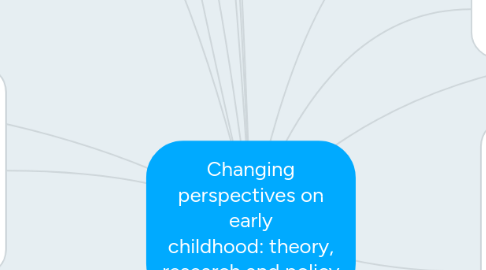Changing perspectives on early childhood: theory, research and policy
저자: valeria vargas

1. Philosophical and scientific interest in early childhood has a very long history, and relevant contributions span the full range of academic disciplines.
2. A DEVELOPMENTAL PERSPECTIVE
2.1. That the early years are formative of children’s long-term prospects is one of the most ancient, enduring and influential themes shaping early childhood policy. It has specific resonance with programmes aiming at intervention in social/economic disadvantage and other adversities, and at prevention of the negative consequences for children’s fortunes.
3. A time of vulnerability…and resilience?Individual qualities help children cope - their temperament, resourcefulness, flexibility, their age and maturity, social competence and so on. Younger children and children whose general health and stamina is weaker are more vulnerable
4. ‘Developmentally appropriate practices’ in contex tthey homogenise ‘children’, making no allowance for individual differences, nor for gender differences, nor for any other aspects of diversity. In consequence, this vision for early childhood development bears little resemblance to the realities of the lives of millions of the world’s children,
5. Diversities in early childhood ‘normal’ developing child fail adequately to acknowledge – far less account for – diversities in young children’s lives, the striking variations in how childhood is understood and experienced, and how it is applied to individual and groups of children.
6. A social and cultural process: It isn’t just about acknowledging that ‘Development and learning occur in and are influenced by multiple social and cultural contexts’ (as in the NAEYC updated statement of DAP referred to above).
7. IV. A HUMAN RIGHTS PERSPECTIVE A new, universal paradigm Social and cultural perspectives on early childhood have liberated early childhood research and policy from over reliance on normative developmental accounts. Much more inclusive frameworks are now available, within which diverse early childhood settings and practices are identified, taken-for-granted early childhood discourses deconstructed and multiple stakeholders identified within the so-called ‘quality debate’.
8. “The Government's aim is for every child, whatever their background or their circumstances, to have the support they need to: * Be healthy * Stay safe * Enjoy and achieve * Make a positive contribution * Achieve economic well-being”
9. Rights and evolving capacities Respect for participatory principles may be tokenistic, disguising conventional power relationships, built around adult agendas, within which children are encouraged to participate according to their age and abilities.
10. To put some order on disparate approaches to early childhood theory and research, this paper is organised into four broad perspectives or paradigms:
11. Developmental; Economic and political; Social and cultural; Human rights.
11.1. Developmental; • Economic and political; • Social and cultural; • Human rights.
12. Implications of neuroscience Scientific arguments for recognising the early years as a sensitive period (developmental ‘prime-time’) have received tantalizing endorsement in recent decades through advances in neuroscience.
13. Constructions and reconstructions of early childhood: A social and cultural paradigm has the advantage that features of early childhood (including the modern Western childhoods that are so often taken as a standard for all) are understood as a product of specific economic, social and cultural processes. This is not to deny the significance of universal maturational processes, nor to deny the particular vulnerability of young children to adversity.
14. Participatory rights in theory and practice A second major feature of rights based policy development concerns the young child’s own role in realising their rights. To construct a positive agenda for rights in early childhood, recognizing young children are ‘…active members of families.


